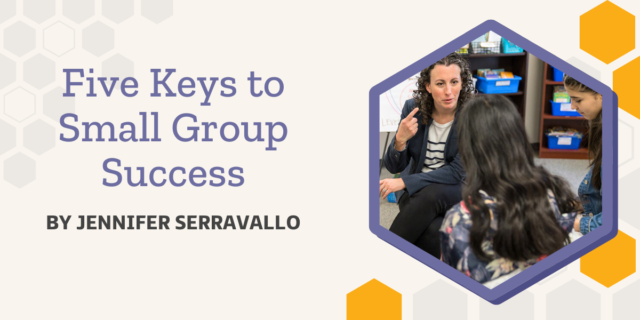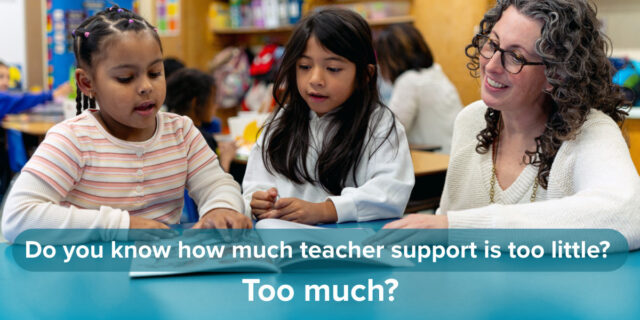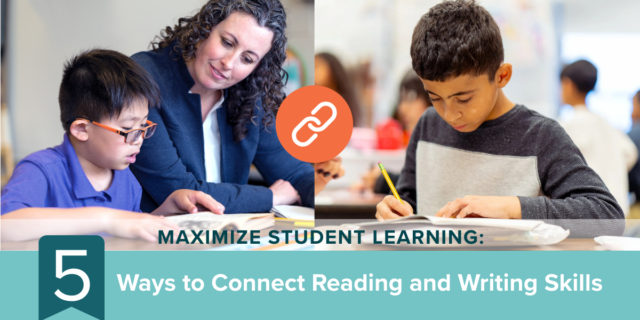
Today on the Heinemann Podcast, we’re excited to announce a new series of professional books. Joining us to talk about this special series is Heinemann author and editor Katie Wood Ray. Katie serves as the series editor of the forthcoming Classroom Essentials Series, and is also an author on one of the series titles.
In the words of author Carl Anderson, “Good teachers aren’t born good teachers. Good teachers learn to be good teachers.”
Books in the Classroom Essentials Series seek to distill the most essential, student-centered practices, and bring the transformative power of foundational ideas to today’s busy teachers, reimagined in new and engaging ways. In each book, readers will see how today’s most progressive practices are built on a solid foundation of research and professional literature.
Our conversation begins with the origins of Classroom Essentials…
Below is a full transcript of our conversation.
Brett: This is a brand new series for Heinemann. We are really excited about this. You are especially excited about this series. Where did the idea for this series come from?
Katie: Well, first of all we are really excited about it. I'm just coming off a couple of days with the whole team of editors at Heinemann thinking about it with the progress we've made towards our vision and looking at samples from the books and it's just a really exciting time to be making books for teachers at Heinemann.
Classroom Essentials really originated from a couple of different places that brought us to the place we are now with this new series of books. One of them was just recognizing the way that reading habits have changed. A lot of us access really important information in ways that were different even ten years ago. But certainly, they're different from thirty years ago when we first started publishing books.
The first professional book that I ever read was Nancie Atwell's In the Middle. It was the late eighties and I was a young, new teacher. And it was three hundred plus pages. And I read it cover- -to-cover. It was assigned in a graduate course. I think I probably would have read it cover-to-cover anyway, but it literally changed the trajectory of my teaching life to read that book. And I think part of how we got here was this recognition that foundational work like you find in Nancie's book, in Lucy Calkins work, in Donald Graves' work, Donald Murray's work, that so much of the progressive, particularly literacy teaching that we see going on today, rests upon, is still as relevant today as it was thirty year ago.
Brett: Oh, yeah, absolutely.
Katie: The foundations haven't changed. The principles, the child centered, student centered principles that we rest this work on have not changed at all. But the way people read has changed.
Brett: Yes.
Katie: So how do you really bring up to date really foundational thinking so that it can reach to people who are reading in a different world today? And what would that look like, and what would it mean to revisit some really important work in the field, but imagine publishing it in a new way? Imagine publishing it in a way that matches more how, particularly busy teachers read and get their PD. I mean teachers are as pressed as they've ever been for time to think well, time to reflect well on what they're doing just because of so many demands.
And so it's really an attempt, the Classroom Essential series, is meant to look back to look at some really foundational work in the field so that we can look forward.
Brett: Sort of on that note, we hear this from teachers all the time. They don't have time. There's so much that's being asked of them in their day, in their week, in their month, in their school year, and in their time. And really, it feels like the idea behind the Classroom Essentials series, both certainly in its design in how these books are laid out and beatifically crafted, is to make these books more accessible. As everything you just said in terms of the accessibility for the teacher to take these topics that are foundational topics that feel maybe they were once kind of complicated, but in reading this series it makes this topic more accessible.
Katie: So the editorial team met with a focus group of teachers. We were talking about a lot of different things, but one of them was trying to really understand the role of PD in their learning and the role, not just that books play, but everything plays in it. But at the end of one of the small focus groups, one of the teachers who was just a passionate, really engaged, interesting person. She said, I just want say one thing. We need shorter books.
Brett: Yeah.
Katie: And I mean that in the best possible way. So we need access to really important ideas in shorter form. We need to be able to get to it more quickly.
Brett: I like to say that these books are more user friendly.
Katie: They're much more user friendly. They're much sharper. I think we're challenging ourselves to write in sharper, more economical ways so that teachers can get access to really important ideas and I've actually worked on one of the first three books.
Brett: Yes, you have.
Katie: So the first three that are coming out in the series. And one of the main reasons that I took that work on is I wanted to understand what it was like to write in this much tighter space. To really do important thinking, but in a different size space than we're used to. And I've outgrown myself as a writer learning to do it. So it is about economy, but what's really important across every single book that we do is that we're not going to sacrifice the integrity of content. Those two things don't have to be at odds. And the way you get there is you slice important topics in different ways. You can do a book that's a broader look at something. Or you can slice something very thin and tiny and look very closely at just one aspect of this teaching.
And what's interesting is that in the first three books that we have in the series, we do both of those things. We have two that have more of a wide angle lens, and then we have one book that is a very close look at one thing. Both of which, have tremendous potential to influence practice because the content is so solid. It's just more economical.
Brett: Well, let's talk about those three. You said that you're certainly authoring one of them, which is very exciting for you to sort of start another book again with us. But tell us about the first three books in this series, in the Classroom Essentials series and who these books are for.
Katie: They're really for everyone, but they meet needs in different ways. I think, without a doubt, primarily we are hoping to reach some teachers who have not traditionally been readers of professional books. With the powerful, transformative ideas that you can find in professional books. Because the way that professional books are written don't necessarily match the way they need to get their professional development.
So we're hoping, again, to introduce teachers who may be less familiar with really foundational work to thought leaders and mentors in this field. Every book in this series will have that element to it in that it will draw attention to the work that it stands on in the field.
So you'll be reading a book and it seems like every time you read a book you read about this guy named Donald Graves and you go man, maybe I should check out this person because they all say that he was a mentor. So I think that they're definitely for newer teachers to professional reading, and not necessarily even newer to the work.
There are a number of people who, for example, engage in workshop teaching because they have support to do workshop teaching, but they don't necessarily know the tradition of professional scholarship that's behind it, right? They know what a workshop is because they have the support again, materials to do it with. But they don't know where that came from, and these books will introduce them to a lot of those important ideas. I think they're also for teachers, any teacher who wants to just polish up a part of their teaching.
Brett: It's a good check in.
Katie: Yeah, a good check in. A revisiting of why does this work matter? Why is it important? And how do you do it? Because all of the books, that's another thing they all have in common. The tag of each title is a teacher's guide too. And we mean guide in its fullest, warmest and also most practical sense. They're not teacher's manuals or guides, they're not going to give you a play by play lesson plan. But they are guides. They're meant to help you get started or move forward with a practice that you're already engaged with really quickly.
Brett: Yeah. And that's sort of the beauty of it. With the authors that are contributing to these books. It's in this space where there is new thinking there because these are foundational things that we've always talked about. But as they are new books, there's new things within that doubling down on those foundations.
Katie: Exactly. And what's interesting about that is the first three books, we went to people who already have a strong voice in the professional conversation to write these first three books. And part of the reason that we wanted to do that was to communicate that we're reaching into a conversation that already exists. But we're bringing it up to date not only in the format in which we're putting it out there so with a different kind of book and the books look different. But also with the author's most updated thinking.
How's It Going? Carl's book on conferring and writing, it's been almost twenty years now since that was first published. It changed the conversation around writing conferences. And it was really the first hefty look at just this one, really crucial part of the teaching of writing. And teachers everywhere learned to ask, how's it going? And then to have something to say in response to that when students answered.
But Carl's been working with teachers in the US and around the world now for all these years to develop that thinking and this book, while it clearly rests on the foundation of that work, it's really his most up to date thinking on it. And so it's not like if you've read How's It Going? you'll look at this new Teacher's Guide to Writing Conferences, which is the name of Carl's book and think, I don't need to read that, I already know that because really, I was stunned. I had to go back, I didn't have to, I was motivated to go back and read How's It Going? just because I was so struck by this feels so fresh and new, and I wanted to think about the differences, and it really is. So it's exciting in that way.
Brett: And we have video of Carl working with students just from a few months ago in different age groups, different levels and just all us sitting, watching him do that conferring on video. It's just very powerful as well.
Katie: It's very powerful. Partly, just because Carl is so smart in such an authentic, down to earth way. It's just I learn about conferring about writing when I watch Carl confer, but I also just learn about being human with children in a way that's really beautiful.
So it does, and that's another thing. Basically all of the books in the Classroom Essentials series are going to have a video, a really robust online resources to begin with. But one of those components will be video. We just feel like it's a really important thing to pair the reading with the video.
Brett: Yeah, as we talk about the modern reader and making it user friendly and very accessible, we felt strongly the video complements that very, very strongly.
Katie: Yeah, yes.
Brett: So next up after Carl, it's you.
Katie: Yeah. So Carl's book will come out first, and then the next book in the series that will come out will be another collaboration that I've done with Lisa Cleveland, who I just learn just so much from her for such a long time. But our book is called Teachers Guide to Getting Started With Beginning Writers. And it's based on some research I did in her classroom. I did it years ago before I started working as an editor at Heinemann and I kind of got consumed by this work here, and it just set there.
I had all this data, all this video, all these notes. And I spent basically the first month of school. I was there every single day in Lisa's classroom documenting how she gets started in kindergarten with her students in writing workshop. Because that's the question people always ask is, how do you have a writing workshop when they don't know how to write? And I had, for years, answered, well, it's not that hard. You just get some paper out and some pens and they'll do something and you get started.
But I really wanted to study it and get a better answer than that and I did. And I'd just never done anything with all of that data. So now we have it and it's interesting because after writing the book, what I really realized that book is about, it's about approximation. And the role that approximation plays in learning and the response that adults have to be able to make to approximation in order to support kids learning.
And it's so important in kindergarten, in first grade, in second grade, but it's also really important in fifth grade and seventh grade and tenth grade. If you were doing something for the first time, people have to accept that you're just going to do it like you're a first timer. That's really exciting. And it has video. The video in it actually shows the first five days.
Brett: Oh, wow.
Katie: And then we have clips also from what I felt like were important teaching moments from that whole first month that impact the rest of the year. So even though it's about the beginning of writing workshop, which doesn't necessarily have to be at the beginning of the year.
Brett: Sure.
Katie: But at some point you have to start the writing workshop, right? So whenever it comes in the year, there's the first five days.
Brett: So just to clarify that, so wherever you start, it's those first five days. So it's not the first five days of the school year, the first five days of the month or the week, it's whenever you actually start. It's those first five days.
Katie: If you're starting with really young children, who probably most of them think, I don't know how to write. And you're going to ask them to go spend the next thirty minutes. Actually, you're not going to ask them to write, you're going to ask them to make books, which we explain in there. But that involves writing. Then how do you convince them that they can do that? And how do you convince them that can do that in a way that they remain independent? That's what's really key.
Brett: That's the key, yeah.
Katie: You know if you give too much direction at the beginning, they're dependent on you to direct them and that's hard to get that to go away. Now for Lisa Cleveland, it is the first five days of school. She always starts the first day because she wants them to think of writing workshop as just what we do every day. But it doesn't have to be. It could be any time.
Brett: And then the third book in the series.
Katie: The third book in the series, which actually will release in early February, so there's a little space between these original three books, is by Jen Serravallo and I'm really excited about this one too. It was great to work with her in an editorial capacity. She's wicked smart and just really embraced what we were trying to do with this series.
The first day I talked to Jen about the series, I started describing it and I got about three sentences in and she took over. She like started describing it to me. And she's out there all the time working with teachers. She's working with a lot of young, new teachers. I think that the work she's put out really is supportive particularly of young, new teachers who are trying to get started in these practices and with this work. And she's just got a great understanding of what teachers need to do this work and so yeah, her book is A Teacher's Guide to Reading Conferences.
So we've got a book on writing conferences and a book on reading conferences in the first three books. And that means a lot to me. That's really important to me because I think at the heart of student centered instruction, is conferring. I mean if you don't do anything else just talking to your students one on one is the most important thing. And you could feel like I don't really know enough to teach writing or I've got so much to learn, but start just by letting then write and talk to them about it.
Brett: Well, that's some of the greatest writing advice that I've heard from you, that I've heard from Carl and Jen. It's just the only way to really grow as a writer, you've got to write. You just got to get to it.
Katie: Yeah. And I think for the series as a whole, we picture these books ad being able to address just a part of your teaching. I think too often our books, they address the whole enchilada. And perhaps they feel overwhelming at times. And, by the way, I'm talking about books that I've written too. Whereas, if you take the luxury to take just a piece of it and say let's just work on this first, maybe that's a better entry point for some people.
Brett: Again, that user design, that accessibility, that little slice of just this is an easier access point to get into it.
Katie: Yeah. And Jen has written about reading conferring in the past but just like Carl, this has her freshest, newest thinking. It's interesting, and I know this as an author myself. By the time your book actually comes out in the world, you're already ready to revise it. Because you're always learning and particularly when you're out as much as Jen and Carl are working with teachers around these ideas. Working in schools with kids, you're always revising your thinking around it. So these books I think really represent again the freshest, newest thinking that the authors have to offer.
Brett: So when we set out to do this series, designers brought into the conversation to really address the access and user friendly nature of these books. Talk a little bit about how these books are designed slightly differently from some of our more traditional professional books.
Katie: I certainly think if you open one of these books up, it's going to have a different look to it than you're used to seeing in a professional book. I mean for one thing, the trim size is different than most of our books. But we really have tried to be incredibly intentional about making sure that the design communicates the content in the most, not only efficient way, but that it always represents the best meaning of the content that it can. And that it enhances the meaning and doesn't get in the way of it. Because that's part of the experience that we're trying to create in these books, is that meaning is the content.
You know, we're not trying to just pretty our books up, but we're trying to really have a meaningful interaction between the design, the visual look of the page and what you see, and the content that's there. And I think that's one of the things that particularly, as an author of one of these books, has really stretched me is to think about content in that way. So, whereas there's something that I might have used lots of words to say before, and everyone really has to put their heads together to think about what is the best way to convey the message, the meaning, the spirit of the work. It's going to be a different kind of reading experience. But, same powerful content.
And after working on them for a year, and really as we started to move forward with the work, I'm so behind the idea of what we're doing. I mean I have always been a devoted professional reader and really owe the trajectory of my whole life as a teacher to the role that professional reading played in that. And to be trying to capture that foundational work and really get it out to even more people than we have, I just really believe in it and I really feel like my most important job now is to make sure that the content always has integrity, and that we do always the best that we can do by the teachers whose work we serve with these books and the children that get impacted by that.
•••
 For many years as the author of bestselling Heinemann books such as About the Authors, Study Driven, Already Ready, and In Pictures and In Words, and as a member of Heinemann’s Professional Development Services, Katie Wood Ray gave teachers resources and PD that transformed writing instruction and helped children discover a lifelong love of writing.
For many years as the author of bestselling Heinemann books such as About the Authors, Study Driven, Already Ready, and In Pictures and In Words, and as a member of Heinemann’s Professional Development Services, Katie Wood Ray gave teachers resources and PD that transformed writing instruction and helped children discover a lifelong love of writing.
In 2014, Katie “moved to the other side of the desk” and joined the dynamic team of editors at Heinemann where she works closely with authors to craft powerful professional books on a range of literacy topics. Katie is also the series editor for the new Classroom Essentials books from Heinemann. Tasked with bringing foundational, progressive practices to a new generation of teachers, Katie works to ensure that the sharp focus and enhanced design of each book best serve the content. She also teamed up with her longtime collaborator, Lisa Cleaveland, to write one of the first books in the series, A Teacher’s Guide to Getting Started with Beginning Writers.
You can find her on Twitter at @KatieWoodRay


